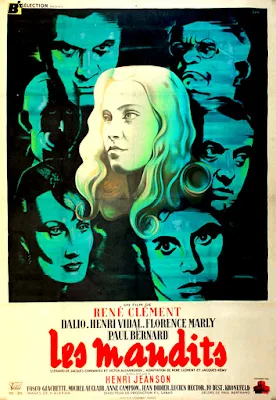 |
| Kyoko Kagawa and Kazuo Hasegawa in A Story From Chikamatsu |
Osan: Kyoko Kagawa
Ishun: Eitaro Shindo
Sukeemon: Eitaro Ozawa
Otama: Yoko Minamida
Director: Kenji Mizoguchi
Screenplay: Matsutaro Kawaguchi, Yoshikata Yoda
Based on a play by Chikamatsu Monzaemon
Cinematography: Kazuo Miyagawa
Production design: Hisakaza Tsuji
Kenji Mizoguchi's A Story From Chikamatsu, which has also been released under the built-in-spoiler title The Crucified Lovers, is based on Chikamatsu Monzaemon's 18th-century play The Legend of the Grand Scroll-Maker. It's a romantic drama about doomed lovers that Mizoguchi and screenwriters Matsutaro Kawaguchi and Yoshikata Yoda have expanded into a fable about greed, injustice, and the subjugation of women. The lovers don't even start out as lovers, but circumstances force them together. Mohei is a somewhat overworked apprentice scroll-maker who is thrown together with his master's wife, Osan, almost by accident. The master, Ishun, is a miser and a philanderer, and the circumstances that initially put Mohei and Osan together are almost the stuff of farce: Osan knows that Ishun has been harassing the pretty maid Otama, trying to persuade her to become his mistress, so Osan hides in the young woman's room one night to try to catch her husband in the act. Instead, Mohei goes to Otama's room and is discovered there with Osan. When Ishun finds out he accuses her of adultery, which as we've been shown earlier in the film is a crime punishable by crucifixion. In addition to this crime, Mohei has also been accused of forgery: Ishun had refused to give Osan's brother a loan, so Mohei agreed to help Osan by using Ishun's seal on a receipt, having been assured that the money would be repaid quickly. When confronted with the forgery, Otama intervenes on behalf of Mohei (whom she secretly loves) and says that she asked for the money. The upshot of all this complex of subterfuges, ultimately caused by Ishun's greed and lechery, is that both Osan and Mohei are forced to flee Ishun's household. They determine that suicide would be more honorable than crucifixion, but when they discover that they are in love with each other, they decide that life in hiding would be preferable to death. Things do not go well, of course, but in the end Ishun gets his comeuppance too. There is perhaps a little too much plot and the outcome is foreseeable, but Mizoguchi's mastery of atmosphere, aided by Kazuo Miyagawa's cinematography, lifts the film high above the melodrama. It's at times a strikingly claustrophobic film, whose boxlike interiors sometimes suggest the grids of Mondrian paintings, underscoring the entrapment not only of the lovers but also of those victims of their own avarice, indifference, or subservience who would punish them. When we're not inside, we're on crowded streets, and even when the lovers escape into the countryside, they're adrift on a fog-shrouded lake or framed by the stalks of a bamboo forest, hinting at prison bars. For some reason, perhaps the overcomplexity of the narrative, A Story From Chikamatsu doesn't hold the honored place in the Mizoguchi canon of Ugetsu (1953), The Life of Oharu (1952), or Sansho the Bailiff (1954), but it's still the work of a master filmmaker.










